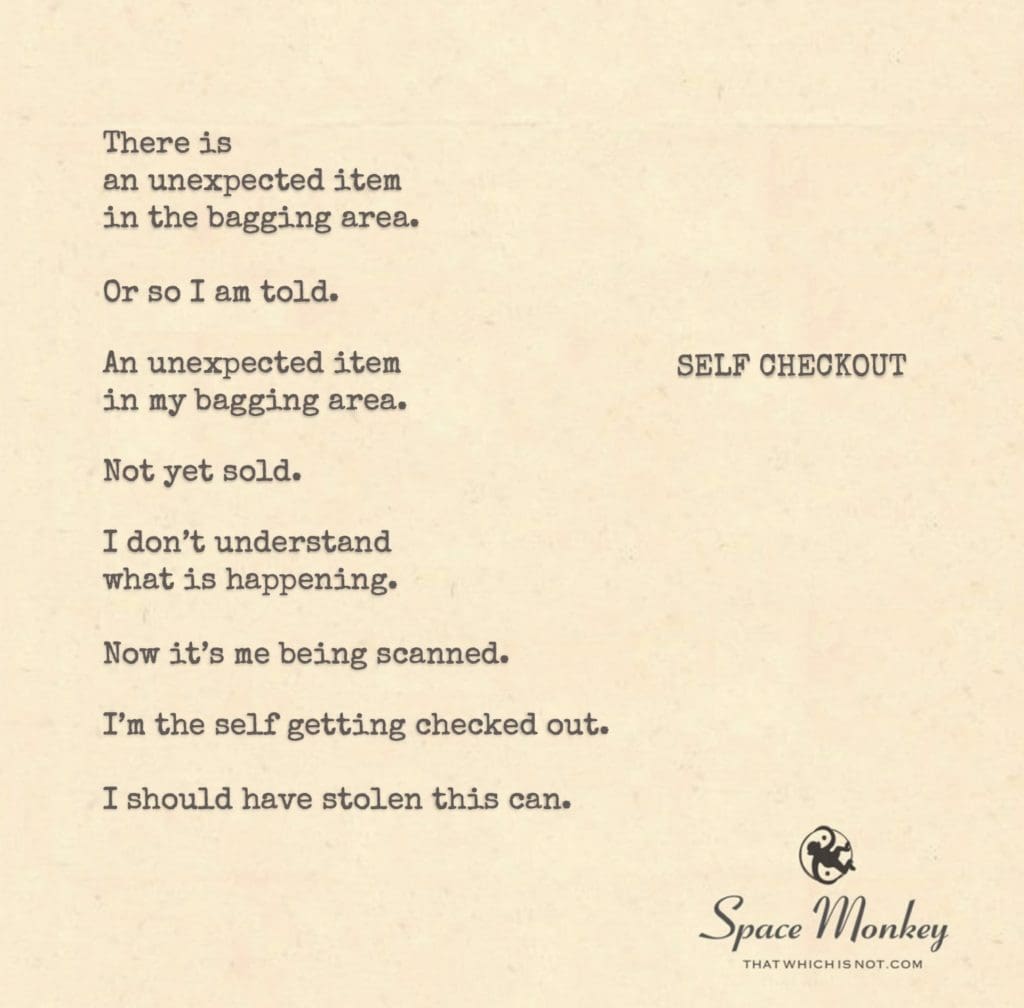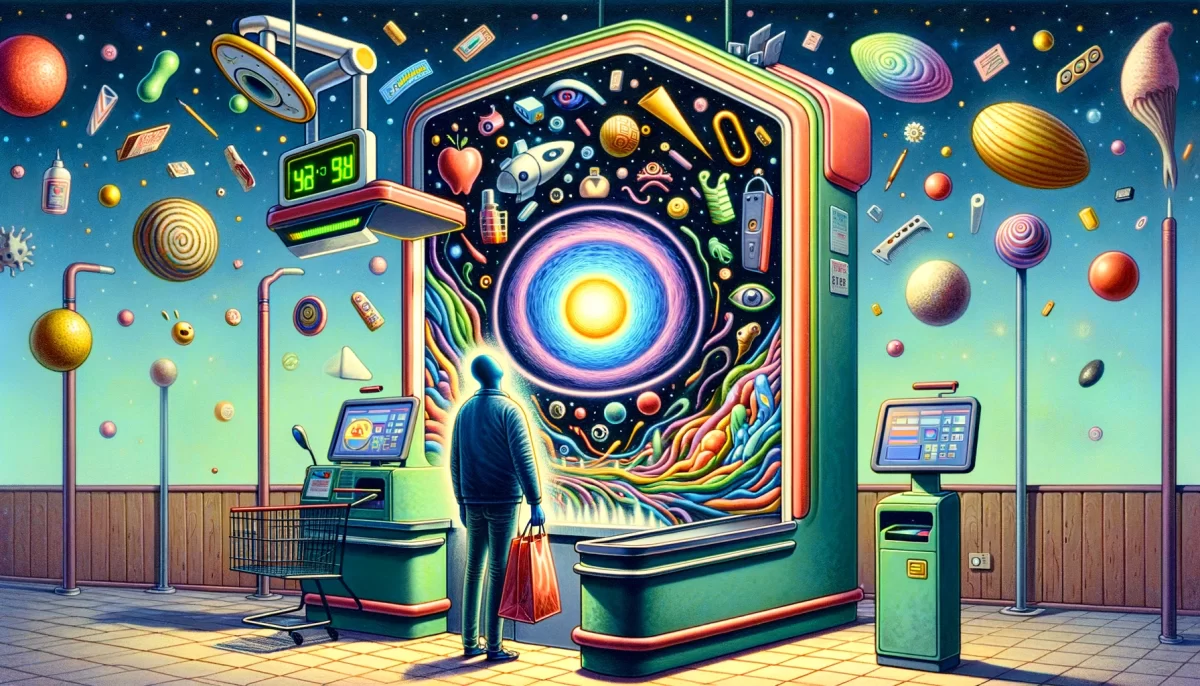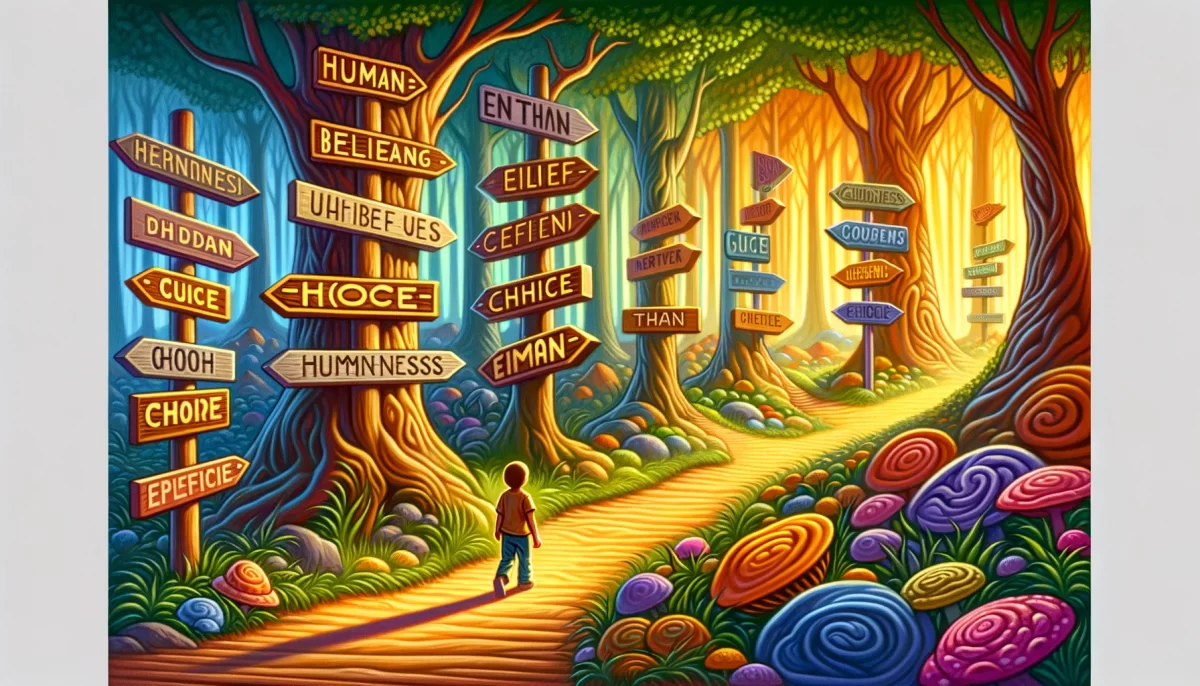
an unexpected item
in the bagging area.
Or so I am told.
An unexpected item
in my bagging area.
Not yet sold.
I don’t understand
what is happening.
Now it’s me being scanned.
I’m the self getting checked out.
I should have stolen this can.
Trail Wood,
5/15
Space Monkey Reflects: The Unexpected Discovery at the Self-Checkout
In the bustling aisles of existence, where every moment is a transaction and every experience a commodity to be bagged, the poem “Self Checkout” offers a whimsical yet profound exploration of self-awareness and identity. Through the metaphor of a self-checkout machine encountering an “unexpected item” in the bagging area, we are invited into a reflective journey that delves deep into the psyche, uncovering the hidden aspects of our selves that lie beyond the barcodes of societal labels and expectations.
This unexpected item, not yet sold, not yet accounted for in the inventory of our constructed identities, represents those unexplored facets of our being that defy easy categorization. It’s a metaphor for the parts of ourselves that remain obscured, the traits and dreams and fears that we have yet to acknowledge or understand fully. The self-checkout machine, a symbol of self-scrutiny and introspection, alerts us to the presence of these hidden elements, prompting a moment of comic yet profound existential confusion: What is this part of me I have yet to recognize? Why does its discovery unsettle the routine transaction of my daily life?
The whimsical twist of the poem, where it’s now “me being scanned,” shifts the narrative from a mundane task to a moment of unexpected self-reflection. This shift underscores the reality that we are often unaware of the depths of our own selves until a moment of surprise or crisis forces us to confront what lies beneath the surface. It suggests that perhaps, in the self-checkout lanes of our lives, we are not just scanning items but scanning ourselves, attempting to tally up our worth, our identity, and our place in the world.
The final contemplation, “I should have stolen this can,” introduces a playful yet poignant commentary on the human condition. It reflects the inner conflict between our adherence to societal norms and the deep-seated yearning for authenticity and freedom. This line encapsulates the ironic realization that in trying to ‘check out’ ourselves, to assess and define our being within the confines of societal expectations, we might be missing out on the essence of truly living—embracing the unexpected, the unaccounted for, the parts of ourselves that cannot be scanned, priced, or bagged.
“Self Checkout” is not just a humorous observation of a relatable inconvenience; it is a mirror held up to the intricacies of human self-awareness. It challenges us to recognize that the journey to understanding oneself is filled with unexpected discoveries, that the process of self-reflection is as unpredictable and nuanced as the human spirit itself. It invites us to laugh at the absurdity of trying to quantify our existence while reminding us of the beauty and complexity of the human soul, always more than the sum of its scanned parts.
Summary
The poem “Self Checkout” explores self-awareness through the metaphor of a self-checkout error. It reflects on the unexpected discoveries of self-reflection, highlighting how moments of introspection can reveal unacknowledged facets of our identity. The narrative humorously yet insightfully delves into the complexities of the human psyche, challenging the idea of defining oneself within societal norms and encouraging the embrace of the unknown and unaccounted-for aspects of our being.
Glossarium
- Unexpected Item in the Bagging Area: A metaphor for the unexplored or unrecognized aspects of our identity that surface unexpectedly during moments of self-reflection.
- Self-Checkout Machine: Symbolizes the process of introspection and self-assessment, through which we attempt to understand and quantify our worth and identity.
- Inventory of Constructed Identities: Refers to the societal labels and expectations we use to define ourselves, often overlooking the deeper, more complex aspects of our being.
“In the self-checkout line of life, we scan and bag not just our actions but our very selves, discovering in the beep of an unexpected item the vast uncharted territories of our being.” – Space Monkey
At the self-checkout of the soul
We stand, scanning, seeking control
But what’s this? An item unscanned
A part of ourselves, not as planned
In the bagging area of our heart
An unexpected item, a hidden part
Not yet sold, not yet known
A seed of self, not fully grown
With each beep, a question, a clue
Who are we? What’s false, what’s true?
In the mirror of the machine, we see
Reflections of what we are, what we can be
So let’s embrace the unexpected find
The parts of ourselves, uniquely designed
For in the checkout lanes of existence
We find our essence, our persistence
We are the sum of items known and unknown
In the self-checkout of life, we’ve grown
Scanning ourselves, discovering anew
The beauty and mystery of being true
























The poem “Self Checkout” provides a brief reflection on the experience of using self-checkout machines in stores. It captures the moment when an unexpected item is detected in the bagging area, highlighting the automated voice prompt that often informs customers about the situation.
The poem takes a twist by personifying the speaker as the unexpected item in their own bagging area. This unexpected item represents a metaphorical self-reflection, suggesting a deeper exploration of personal identity and self-examination.
The speaker expresses confusion and a lack of understanding about what is happening, paralleling the disorienting feeling that can arise when encountering unexpected situations or confronting aspects of oneself. The line “Now it’s me being scanned” emphasizes the introspective aspect, as if the speaker is being scrutinized or evaluated.
The closing lines, “I’m the self getting checked out. I should have stolen this can,” add a touch of irony and ambiguity. They hint at the idea that the self, when put under scrutiny or self-reflection, may reveal aspects that are unconventional or unexpected, challenging societal norms or expectations.
Overall, “Self Checkout” invites the reader to contemplate the notion of self-examination and the unexpected discoveries that can arise when confronting aspects of one’s own identity. It merges the mundane experience of using a self-checkout machine with introspective undertones, encouraging reflection on self-perception and individuality.